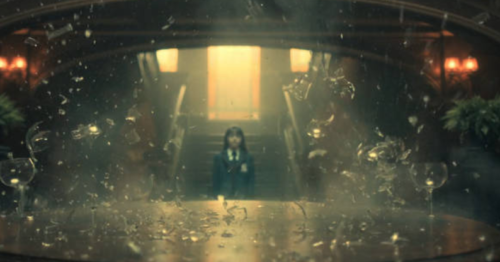In one of the many cruel ironies presented throughout The Umbrella Academy, the cruelest of all is the manner in which Number Seven a.k.a. Vanya Hargreeves’ (Ellen Page) powers are suppressed when she’s around four years old. Along with her other “brothers” and “sister” (adopted just like her, and all born on the same day to mothers who became spontaneously pregnant), Vanya’s eccentric billionaire father, Reginald Hargreeves (Colm Feore), who isn’t much of a father at all (which is why he designs a fembot to give them the parental love he can’t), begins to train her in the art of how to use and perfect her powers once she’s sentient enough to vaguely fathom what she’s capable of.
In Vanya’s case, that power is acting like a tuning fork (hence, her later becoming a violinist) to pick up a sound around her that will allow her to harness it and convert it into energy. In layman’s terms, she explodes shit. And that becomes quickly concerning to Reginald when he sees just how temperamental, how “moody” she can be. Obviously, in his mind, especially as a woman. For even women with supernatural powers should still wield them in a “lady-like” fashion, right?
After only a few practice sessions, Reginald becomes most affronted when Vanya responds to his slave driving (“This is one of your designated training days,” he scolds her at one point for her disinterest) by shattering not only the glasses he sets out for her on the table, but also the glass of his monocle, giving him a swift cut to the cheek. And a swift reminder of Vanya’s strength, even at such a young age. Imagining the damage she could do in the future without him around to be viewed as a guiding presence with such remarks as, “Your insolence is unacceptable!,” Reginald decides suppression is the best method, particularly after this incident with the monocle, when his reaction to her “monstrousness” conditions her to fear her own power. And, in the first place, “Number Seven showed an unexpected resistance to her training.” Perhaps somewhere knowing within herself that she would not be accepted by the patriarch who was already so stern and unloving if she revealed her complete self. Though there is no doubt in one’s mind that if, say, Number One a.k.a. Luther (Tom Hopper) had been the one to exhibit these powers, Reginald would have been more enchanted by them existing within his male carapace. Because men have reason, rationality (as Donald Trump shows us every day, n’est-ce pas?).
He solemnly tells her, with blood dripping underneath his eye, “I believe that will conclude your training for the time being.” But it doesn’t, at least not in the form of training her to be meek and afraid of her own shadow instead. So it is that Reginald declares, “We’re going to try something new, Number Seven,” leading her down to the depths of the house where he has built her a soundproof dungeon so she can’t pick up any notes that are convertible by her destructive energy. “It was an accident,” Seven pleas, the scab on her father’s eye taunting her with the continued accusation that her very essence is wrong. “I understand,” Reginald placates. But he does not. All he understands is that Number Seven is a powerful female, and that her “girly emotions” only make that power all the more volatile.
“You need to remain in a controlled environment,” Reginald informs her as he places her in the prison. One can almost imagine this is what men also used to tell the women they kept in the kitchen until the unrest of the 1960s erupted. What’s more, his diary before this moment had already declared, “A controlled environment has proven ideal for the maximum impact of Number Seven’s powers. But in the face of sure, uninvited chaos, she must be trained to locate control in another form.” Alas she was never “trained” to do so before Reginald decided it would be easier to simply have her only sister, Allison (Emmy Raver-Lampman), “rumor” her (sort of the way vampires glamor) into believing she was “just ordinary.” Thus, he engages in the quintessential misogynistic behavior of pitting two women against together, for this event comes back to haunt both Vanya and Allison in a catastrophic way in episode eight, “I Heard A Rumor,” of season one.
Had Reginald been capable of the basic decency (the kind that Allison shows time and time again when everyone else in the family still wants to subjugate Number Seven–proving that the feminine “weakness” of empathy is a more effective method than the male “virtue” of callousness in “war”), he might have found it within himself to give Vanya the continued time and attention she needed. By showing her love and acceptance as opposed to disgust and mercilessness, Reginald could have made her childhood and beyond so much less painful. What’s more, displaying such inhumanity toward her only served to subconsciously impart to her that ruthlessness is the best way to secure one’s will. And oh, how she secures her own once she rediscovers the true extent of her powers. For a woman is consistently taught that to be taken seriously by a man with power, she must sink to his level, rather than rise to her own.
If anything, however, Reginald’s attempt at quelling Vanya backfiring so spectacularly only serves to iterate that you can’t keep a good woman down–even if a male’s oppressing actions have turned her “evil”–essentially how all women with great power are viewed by the men threatened they might no longer have any of their own.






















